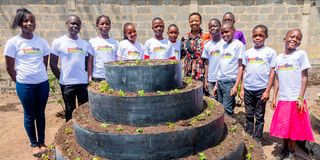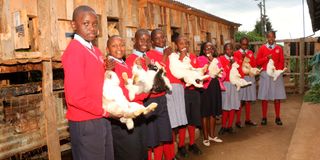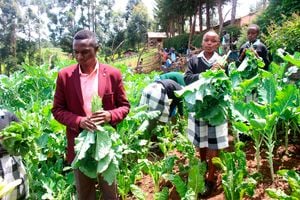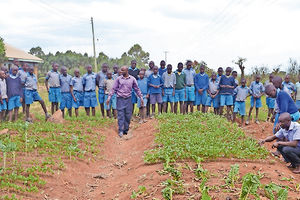
First Lady, Mama Rachel Ruto, poses with 4k Club members from Kaptembwa Primary School in Nakuru during World Children's Day on November 20, 2024.
4K Clubs (Kuungana, Kufanya, Kusaidia Kenya), a once-vibrant programme designed to teach children farming skills, are being revived to address pressing challenges of hunger, malnutrition and youth disinterest in agriculture.
The initiative, active in public and private learning institutions, aims to harness the potential of gardens to provide sustainable school meals and foster a culture of innovation.
The programme aligns with the Bottom-Up Economic Transformation Agenda of the government, which places agriculture at the centre of national development.
By transforming idle school grounds into gardens, the 4K Clubs seek to enhance nutrition, improve school attendance and equip the young with key skills for the future.
Established in the 1970s, 4K Clubs were a cornerstone of Kenya’s education, inspiring children to engage in farming.
However, their popularity waned over the years due to changing school priorities and negative perceptions of farming. The clubs had largely faded by the early 2000s.
Food security
A renewed focus on food security and youth awareness has sparked their revival. The government and schools began reintroducing 4K Clubs as a way of integrating sustainable farming into the education system in 2021.

4K Club members at John Paul II Schools Dimesse in Nyahururu, Laikipia County, accompanied by their teacher Ms Alice Waithaka, hold rabbits.
“The clubs are about much more than farming,” says Charles Lusweti, CEO of the 4K Clubs.
“They’re about building a generation that sees agriculture as a solution to hunger and an opportunity for economic growth.”
At the heart of the 4K Clubs’ revival are kitchen gardens, which have turned previously underutilised school spaces into thriving farming hubs. These gardens produce vegetables, fruits and herbs that supplement state-provided school meals.
The Mama Kitchen Gardens Initiative, which began as a pilot at State House Nairobi in September, is a blueprint for this revival.
The gardens, initially designed to produce vegetables for State House employees and nearby schools, have demonstrated the feasibility of urban farming and its potential to boost nutrition.
Following the success of the pilot, the programme has been extended to State House, St Georges and Nairobi Primary Schools, with plans to scale it up across the country.
Schools are encouraged to grow short-term crops like vegetables and herbs at kitchen gardens and to establish fruit gardens for long-term gains.
Schools with large tracts of land are supported to grow staple foods, with the Ministry of Agriculture providing expertise. By integrating these activities into the Competency-Based Curriculum (CBC), students learn the science of agriculture and gain experience in sustainable farming. This practical approach is invaluable in fostering a generation of eco-conscious and food-secure citizens.
“We’re teaching children the science and practice of agriculture,” a St George’s Primary school teacher says.
“They’re gaining skills they can use at home and in future.”
The World Bank’s Africa Pulse Report paints a grim picture on nutrition – Seven in 10 children in Sub-Sahara are deprived of the benefits of pre-primary education due to hunger and malnutrition. Malnutrition remains a barrier to education in Kenya, particularly in rural areas where hunger leads to absenteeism and poor school performance.
By integrating gardening into the school curriculum, 4K Clubs are providing a direct solution to these challenges.
Fresh produce from the gardens enhances the nutritional value of school meals, ensuring children receive balanced diets essential for growth and cognitive development.
External food supplies
“Children are coming to school healthier and more focused,” says a headteacher in Nakuru, where the programme is reducing dependence on external food supplies.
Beyond feeding children, the clubs promote the broader culture of farming innovation. Pupils are exposed to eco-friendly practices like aquaponics and vertical farming.

4K Club members at Sokoro Primary School in Elburgon, Nakuru County with their teachers.
The programme also stresses environment conservation, teaching young people the importance of sustainable resource management.
This focus on innovation is part of a larger strategy by the Ministry of Agriculture, which includes similar programmes like Young Farmers Clubs for secondary schools and training for out-of-school youth.
4K Clubs are active in more than 2,000 schools and demand for their expansion is growing. With more than 10 million children in need of support, scaling the programme will require substantial investment from the government, the private sector and community players.
Last month, First Lady Rachel Ruto was named champion of the Kenya School Meals Coalition, an advocacy role that complements the objectives of 4K Clubs.
Her call for more funding and partnerships highlighted the need for collective action to close the gap in school feeding. As a trained teacher, the First Lady says she understands the struggles of educating a hungry child.
“Hunger is more than pain in the stomach. It steals dreams and potential. It prevents children from concentrating in class, stunts their cognitive development and contributes to high dropout rates, ” she says.
She stated during the World Children’s Day celebrations at Kaptembwa Primary School in Nakuru County: “We will not let hunger steal our children’s potential.”
Lusweti says this is not just a state initiative and urges parents, teachers and private partners to contribute to its success.
4K Clubs are being closely watched across the continent, where challenges of hunger and joblessness persist. As Africa’s population grows, the revival of school-based agricultural programmes could serve as a blueprint for sustainable development.
By revitalising 4K Clubs, Kenya is addressing hunger and reshaping its educational and economic future. The initiative has sown the seeds of resilience, innovation and hope.










